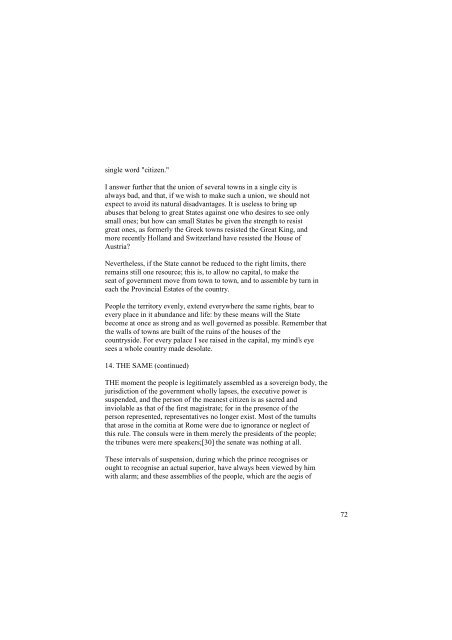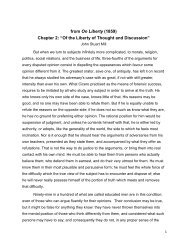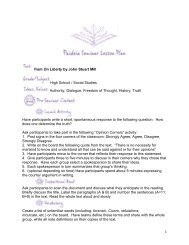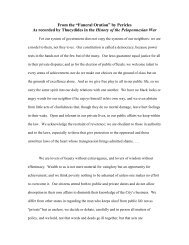Rousseau_contrat-social
You also want an ePaper? Increase the reach of your titles
YUMPU automatically turns print PDFs into web optimized ePapers that Google loves.
single word "citizen."<br />
I answer further that the union of several towns in a single city is<br />
always bad, and that, if we wish to make such a union, we should not<br />
expect to avoid its natural disadvantages. It is useless to bring up<br />
abuses that belong to great States against one who desires to see only<br />
small ones; but how can small States be given the strength to resist<br />
great ones, as formerly the Greek towns resisted the Great King, and<br />
more recently Holland and Switzerland have resisted the House of<br />
Austria?<br />
Nevertheless, if the State cannot be reduced to the right limits, there<br />
remains still one resource; this is, to allow no capital, to make the<br />
seat of government move from town to town, and to assemble by turn in<br />
each the Provincial Estates of the country.<br />
People the territory evenly, extend everywhere the same rights, bear to<br />
every place in it abundance and life: by these means will the State<br />
become at once as strong and as well governed as possible. Remember that<br />
the walls of towns are built of the ruins of the houses of the<br />
countryside. For every palace I see raised in the capital, my mind’s eye<br />
sees a whole country made desolate.<br />
14. THE SAME (continued)<br />
THE moment the people is legitimately assembled as a sovereign body, the<br />
jurisdiction of the government wholly lapses, the executive power is<br />
suspended, and the person of the meanest citizen is as sacred and<br />
inviolable as that of the first magistrate; for in the presence of the<br />
person represented, representatives no longer exist. Most of the tumults<br />
that arose in the comitia at Rome were due to ignorance or neglect of<br />
this rule. The consuls were in them merely the presidents of the people;<br />
the tribunes were mere speakers;[30] the senate was nothing at all.<br />
These intervals of suspension, during which the prince recognises or<br />
ought to recognise an actual superior, have always been viewed by him<br />
with alarm; and these assemblies of the people, which are the aegis of<br />
72











